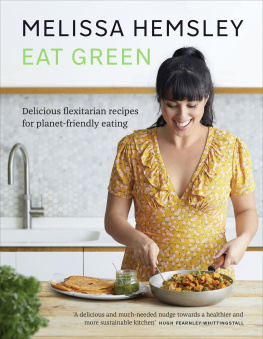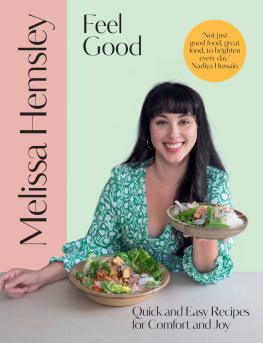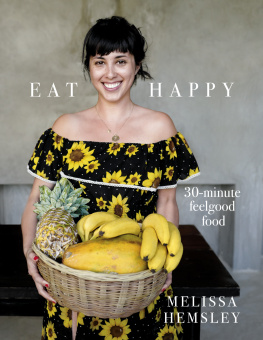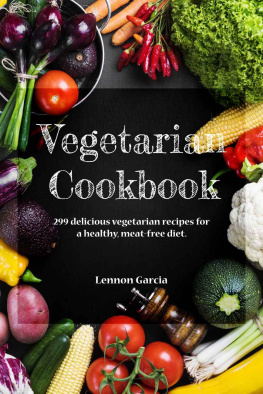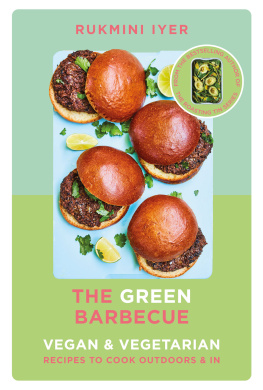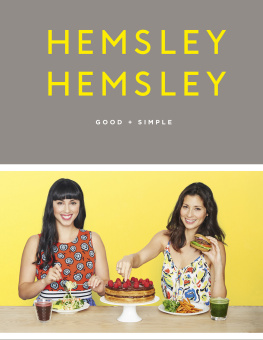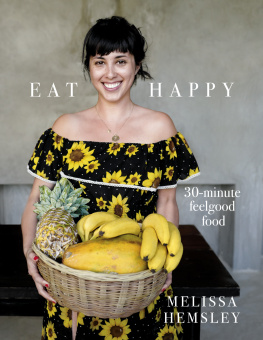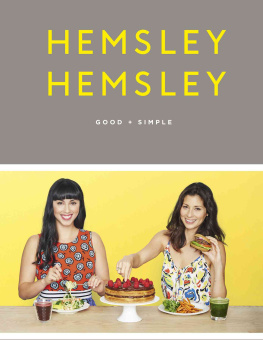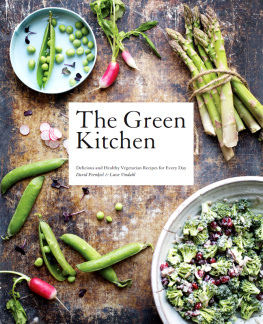EAT GREEN
MELISSA HEMSLEY

Foreword
by Guy Singh-Watson, farmer and founder of Riverford
I first met Melissa foraging for samphire on a salt marsh near our farm in Devon; a bright touch of urban glamour in the mud, as I remember. As a grumpy, old-welly wearing farmer I am programmed to rebuff the arrival of fashion and lipstick in my fields, but even I have to acknowledge that we need a lighter, more optimistic, younger and more glamourous touch than mine if we are to address the gravity of the environmental, health and social problems associated with our cooking and eating habits. Responsible eating needs to be enjoyable, easy and accessible if it is to become mainstream, as it must. The pages that follow prove how achievable that can be. We have a global food and agribusiness determined to perpetuate the world they have thrived in, but, together, with determination and persistence, we can create a better world through the informed choices we make in our kitchens and around our tables.
My father started farming at Riverford in 1951; food rationing had three years to run with recent memories of German U-boats almost starving our nation into submission fresh in policy makers minds; producing more at home was, quite rightly, the priority. Sixty years of, largely unquestioned, intensification were the result and animal welfare, our soils and wildlife and the nutritional quality of our food paid the price. During my fifty years in wellies, food choices have become infinitely wider and prices substantially lower to the extent where farmers earn a mere 0.7% of GDP leaving more to be spent on rent and technology. Meanwhile, despite the rise of celebrity chefs, cooking skills have been eroded with ever more money spent on promoting ever more processed food with an ever-longer shelf life and ever more ingredients unrecognisable to anyone but a chemist.
Somehow, all that choice and customer empowerment is leading us in the wrong direction; the direction of diet-induced ill health and environmental destruction that threatens the lives of our children. With so many people now looking for better and more responsibly produced food, but so little available, one must conclude that both the government and the market forces are failing us. I urge you to ask the difficult questions and not be fobbed of with glib and easy answers; abandon irresponsible notions of farming; confront the reality of factory farms, gang labour and a ravaged landscape. Having asked those questions and found the suppliers who can answer them honestly, support them; they need you. Producing food the right way is never easy and seldom profitable in the short run. We must put our health, our society and environmental sanity ahead of the environmental insanity that fills our supermarket shelves and restaurant menus. How we shop and eat represent some of the most important choices that will determine the quality of our childrens lives and the habitability of our planet; Melissa will help us make the right choices more often.
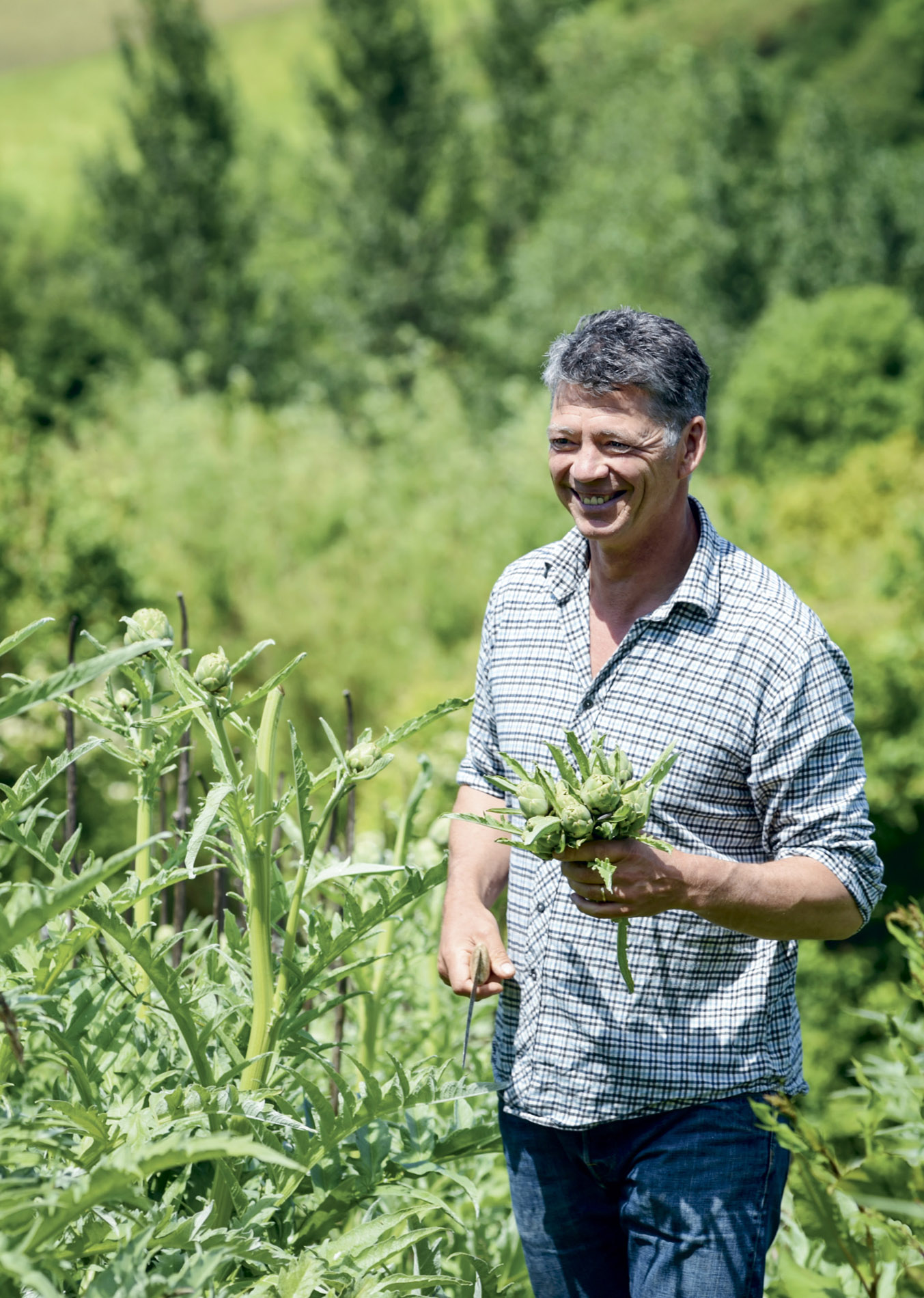
Introduction
Food is one of lifes greatest pleasures, but we know that what we eat, how our food is produced, and throwing away mountains of edible waste all have an enormous impact on our planet. In Eat Green I want to help you enjoy wonderful, easy-to-cook meals, while also making some small changes that will reduce our negative impact on the natural world.
I wanted to write a cookbook for everyone, whether youre vegetarian, vegan, or an omnivore like me. I wanted it to be a book of easy and delicious recipes that advocates a more environmentally friendly way of cooking and eating, but also a book that recognises that for some people and their families, cutting out dairy, fish and meat is unsustainable or unrealistic. Eat Green is packed with time-savvy, tasty flexitarian recipes, which allow quality meat or fish to be swapped in or out and also shows you how being more flexible in your approach to cooking is practical, enjoyable and doable, day in and day out. Whether its cycling instead of driving or saying no to single-use plastic and fast fashion, it is when we make small changes part of our daily life that we begin to make a difference.
These are dishes that are easy to shop for, simple to make, always delicious, and celebrate the best of the seasons all year round. I have also included simple swaps throughout the book to ensure that all the recipes can be adapted to be vegetarian and many can be vegan. Every recipe is naturally gluten-free (depending on the type of pasta or noodles you choose to use) and Ive tried to provide nut-free alternatives where possible so that everyone is welcome at the table.
When we respect ingredients in all their glory by celebrating food that is full of natural flavour, and is satisfying and energising, it helps us to reconnect to nature and all its bounty whether that be an amazingly ripe summer strawberry, a carrot and its delicious green carrot tops, or responsibly-sourced fresh fish and to cherish its value. And to help our wallets as well as the planet, Ive based these recipes on the most popular fruit and veg that fill our fridges and our bins the ones that are most bought and those most thrown away.
As well as the joy of making tasty, nourishing home-cooked food, it feels good to play our part, to make a difference, to reconnect to the food we eat and to celebrate the seasons, our local community and our farmers.
By cooking your way through these pages youll see how effortless not to mention cheaper it is to create your own meals using up what youve got, and how to freestyle more confidently with seasonal ingredients rather than heading out with a recipes rigid list of ingredients that we must bring home. And Ive included plenty of everyday waste-reducing tips.
Eat Green is for busy people with busy lives: families with young children who need much-loved favourites to encourage their children to eat good, homemade food; hard-working couples and individuals who want fast and healthy dinners in 30 minutes and nutritious, hearty, make-ahead meals to batch-cook and sustain them for the week; and, with its recipes for larger gatherings, it is for people who love to come around a table with friends and celebrate a wonderful meal.
Above all, I hope to share with you the bonuses of being more savvy and more sustainable by way of the joy, great taste and satisfaction we can feel from getting the most out of what we buy, cook and eat.
Doing our best
The state of the planet can feel frightening and we know that drastic change is needed. Sustainability isnt about a few people doing things perfectly. Its small, achievable daily changes that lots of us commit to taking on long term.
Im a cook and writer, not an environmental expert, but what Ive learnt from the examples set by people like Geetie and Guy Singh-Watson, Hugh Fearnley-Whittingstall, celebrated chefs Skye Gyngell and Doug McMaster, and Tristram Stuart of Feedback is that you and I do not need to be experts to help make the world a better place. We are all in this together and we can all help. I am far from a perfectly sustainable, self-sufficient citizen of the planet that would be impossible for most of us but I try a little every day to be that bit more responsible for my impact. Collectively, all of our positive adjustments will make a difference.
We dont need a handful of people doing zero waste perfectly, we need millions of people doing it imperfectly.

